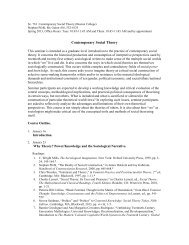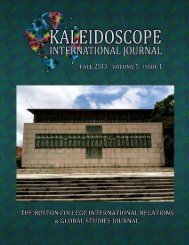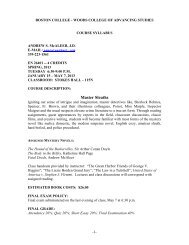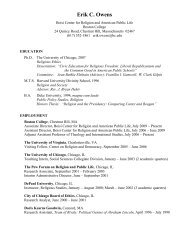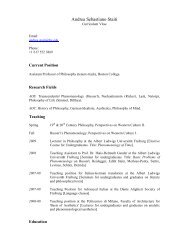separation of powers in thought and practice? - Boston College
separation of powers in thought and practice? - Boston College
separation of powers in thought and practice? - Boston College
Create successful ePaper yourself
Turn your PDF publications into a flip-book with our unique Google optimized e-Paper software.
2013] Separation <strong>of</strong> Powers <strong>in</strong> Thought <strong>and</strong> Practice? 451<br />
lat<strong>in</strong>g <strong>and</strong> judg<strong>in</strong>g, <strong>and</strong> between judg<strong>in</strong>g <strong>and</strong> enforcement, would be<br />
erased.60<br />
One <strong>of</strong> Montesquieu’s images, <strong>in</strong>deed a very common image <strong>in</strong><br />
mid <strong>and</strong> late eighteenth-century political <strong>thought</strong>, is the image <strong>of</strong> Turkish<br />
justice—a judge <strong>in</strong> a despotic state who simply comes upon someone<br />
do<strong>in</strong>g someth<strong>in</strong>g <strong>and</strong> lashes out at him, beat<strong>in</strong>g him or kill<strong>in</strong>g him<br />
or tak<strong>in</strong>g his property, without anyth<strong>in</strong>g remotely like an account <strong>of</strong><br />
what the victim is supposed to have done, let alone any sort <strong>of</strong> hear<strong>in</strong>g.61<br />
As Montesquieu states <strong>in</strong> a famous chapter <strong>in</strong> The Spirit <strong>of</strong> the<br />
Laws, “Among the Turks, where the three <strong>powers</strong> are united <strong>in</strong> the person<br />
<strong>of</strong> the sultan, an atrocious despotism reigns.”62 A little earlier <strong>in</strong> the<br />
book, Montesquieu tells us someth<strong>in</strong>g odd: “It is constantly said that<br />
justice should be rendered everywhere as it is <strong>in</strong> Turkey.”63 Really? Constantly<br />
said by whom? The answer, it turns out, is that this was constantly<br />
said by people who were irritated by the elaborate technicality <strong>and</strong> legalism<br />
<strong>of</strong> French society, where there were <strong>in</strong>numerable rules, privileges,<br />
<strong>and</strong> jurisdictions, as well as <strong>in</strong>term<strong>in</strong>able procedures for secur<strong>in</strong>g<br />
any sort <strong>of</strong> relief.64 Each claim was broken down <strong>in</strong>to its detailed parts<br />
<strong>and</strong> assessed aga<strong>in</strong>st the relevant st<strong>and</strong>ards <strong>and</strong> the repository <strong>of</strong> judicial<br />
decisions. And many good-hearted people apparently protested<br />
aga<strong>in</strong>st this elaborate legalism,65 imag<strong>in</strong><strong>in</strong>g that it would be better to be<br />
ruled by a sort <strong>of</strong> Solomonic cadi-figure, able to cut through all the legalism<br />
<strong>and</strong> see through to the moral essentials <strong>of</strong> the matter.66 And<br />
60 See Montesquieu, supra note 40, at 157 (articulat<strong>in</strong>g a worry, well before the famous<br />
passage from Book XI on the <strong>separation</strong> <strong>of</strong> <strong>powers</strong>, that <strong>in</strong> a monarchy when the sovereign<br />
took on the role <strong>of</strong> judge <strong>and</strong> an accused person was set free, “one would not know if a<br />
man had been acquitted or pardoned”).<br />
61 See e.g. Jeremy Bentham, Of Laws <strong>in</strong> General 153 (H.L.A. Hart ed., 1970) (n.d.) (“A<br />
Cadi comes by a baker’s shop, <strong>and</strong> f<strong>in</strong>ds the bread short <strong>of</strong> weight: the baker is hanged <strong>in</strong><br />
consequence. This, if it be part <strong>of</strong> the design that other bakers should take notice <strong>of</strong> it, is a<br />
sort <strong>of</strong> law forbidd<strong>in</strong>g the sell<strong>in</strong>g <strong>of</strong> bread short <strong>of</strong> weight under the pa<strong>in</strong> <strong>of</strong> hang<strong>in</strong>g.”).<br />
62 Montesquieu, supra note 40, at 157.<br />
63 Id. at 74.<br />
64 There are h<strong>in</strong>ts <strong>of</strong> this <strong>in</strong> Montesquieu’s earlier work. See Montesquieu, Persian Letters<br />
(C.J. Betts ed., Pengu<strong>in</strong> 1973) (1721) (letters 44, 68, <strong>and</strong> 86). The suggestion seemed to<br />
orig<strong>in</strong>ate from Jean Bod<strong>in</strong>’s work, admir<strong>in</strong>g the simplicity <strong>of</strong> absolutist adm<strong>in</strong>istration <strong>in</strong><br />
Turkey. See Mark Hulliung, Montesquieu <strong>and</strong> the Old Regime 93–97 (1976).<br />
65 Others provide discussions <strong>of</strong> “all-pervasive legalism” <strong>in</strong> seventeenth <strong>and</strong> eighteenthcentury<br />
France. See David Parker, La Rochelle <strong>and</strong> the French Monarchy: Conflict<br />
<strong>and</strong> Order <strong>in</strong> 17th-Century France 19 (1980); Michael P. Breen, Patronage, Politics, <strong>and</strong><br />
the “Rule <strong>of</strong> Law” <strong>in</strong> Early Modern France, 33 Proc. W. Soc’y for French Hist. 95, 98 n.8<br />
(2005), available at http://hdl.h<strong>and</strong>le.net/2027/spo.0642292.0033.006.<br />
66 Cf. Max Weber, Economy <strong>and</strong> Society 882–89 (Guenther Roth & Claus Wittich<br />
eds., Ephraim Fisch<strong>of</strong>f et al. trans., 1978) (1922) (describ<strong>in</strong>g the futile call for straightfor-





